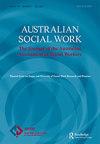立足于两个世界的生活理论:托雷斯海峡岛民的当代移民体验
IF 2
3区 社会学
Q2 SOCIAL WORK
引用次数: 1
摘要
摘要本研究探讨了移居澳大利亚大陆的托雷斯海峡岛民的重新安置经历。采用扎根理论方法,对11名个体进行了深度半结构化访谈。研究结果表明,托雷斯海峡岛民的当代推动者正在适应而不是同化澳大利亚主流文化。“生活在两个世界”的概念要求管理岛屿生活的义务与主流的要求和期望之间的交叉。随着人们对自己的经历有了理解,先行者们制定了从一个世界到另一个世界的“管理穿越”策略——“岛屿生活”的简单生活方式提供了更大的确定感和熟悉感,而“主流”可能会带来许多挑战、相互竞争的需求和期望。虽然托雷斯海峡岛民外出运动是内部的,但与国际移民经历有相似之处,与其他内部运动一样,这场运动往往被忽视。移民是社会工作实践的一个重要领域,需要社会工作者的关注,特别是在应对经济和气候相关变化时,预计外出流动可能会增加的情况下。社会工作文献中没有托雷斯海峡岛民的内部移民。关于当代移民如何体验和理解大陆生活的知识存在差距。社会工作可以从这场运动中学习,为未来的移民做好准备,以应对国内外的环境和经济需求。本文章由计算机程序翻译,如有差异,请以英文原文为准。
A Grounded Theory of Living in Two Worlds: Torres Strait Islanders’ Experience of Contemporary Migration
ABSTRACT This study explored the resettlement experiences of Torres Strait Islanders who moved to the Australian mainland. In-depth semi-structured interviews were conducted with 11 individuals, using a grounded theory method. Findings suggest that Torres Strait Islander contemporary out-movers are adjusting rather than assimilating to the Australian mainstream culture. The concept of “living in two worlds” required managing the crossing between the obligations of island life and demands and expectations of the mainstream. As people made sense of their experiences, out-movers developed strategies to “manage the crossings” from one world to another- the simpler lifestyle of “island life” that offered a greater sense of certainty and familiarity, and “mainstream” which may present many challenges, competing demands and expectations. While Torres Strait Islander out-movement is internal, there are similarities to international migration experiences, and like other internal movements, this movement tended to go unnoticed. Migration is an important area of social work practice that needs the attention of social workers, particularly with the predicted increases in out-movements that may occur in response to economic and climate-related change. IMPLICATIONS Torres Strait Islander internal migration is absent from social work literature. There is a gap in knowledge of how contemporary migrants experience and make sense of life on the mainland. Social work can learn from this movement to prepare for future migration responding to environmental and economic imperatives, both internally and internationally.
求助全文
通过发布文献求助,成功后即可免费获取论文全文。
去求助
来源期刊

Australian Social Work
SOCIAL WORK-
CiteScore
4.20
自引率
16.70%
发文量
37
期刊介绍:
Australian Social Work is an international peer-reviewed journal reflecting current thinking and trends in Social Work. The Journal promotes the development of practice, policy and education, and publishes original research, theoretical papers and critical reviews that build on existing knowledge. The Journal also publishes reviews of relevant professional literature, commentary and analysis of social policies and encourages debate in the form of reader commentary on articles. Australian Social Work has grown out of the Australian context and continues to provide a vehicle for Australian and international authors. The Journal invites submission of papers from authors worldwide and all contributors are encouraged to present their work for an international readership.
 求助内容:
求助内容: 应助结果提醒方式:
应助结果提醒方式:


